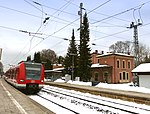Tutzing is a municipality in the district of Starnberg in Bavaria, Germany, on the west bank of the Starnberger See. Just 40 km south-west of Munich and with good views of the Alps, the town was traditionally a favorite vacation spot for those living in the city.
In 1873 Johannes Brahms spent four summer months in Tutzing, completing his String Quartets Opus 51 and writing the Haydn Variations. A small lakeside park is dedicated to him, and a plaque stands near the large house where he lived and worked.
The town of 10,000 is home to many commuters to Munich, as well as to retirees. Tutzing station is both a terminus of Munich's S-Bahn rail network and a regional train hub serving Innsbruck, Mittenwald, Garmisch-Partenkirchen, Reutte, Kochel and Oberammergau.
Tutzing is equipped with a regional hospital and various clinics. It hosts the conference centre Evangelische Akademie Tutzing, founded in 1947.
Tourists and cyclists continue to visit, often while circling the lake or starting or ending a hike. Horseback riding is possible from a number of nearby farms.
Tutzing has been home to various German celebrities, including the former president of the Federal Constitutional Court Hans-Jürgen Papier, musicians Peter Maffay, Leslie Mándoki, and Elly Ney, the late Guido Dessauer, and the military general and theorist Erich Ludendorff, who died and is buried in the town.
During the Nazi period, Trutskirch-Tutzing (Dornier), a forced-labor factory for the Dornier-Werke GmbH aircraft concern, was a sub-camp of Dachau Concentration Camp. The town was also a stop on the "trail of tears" of inmates forcibly marched south in 1945; a plaque at the town hall commemorates them.










